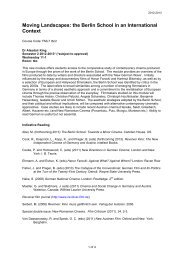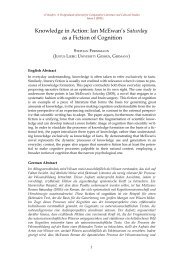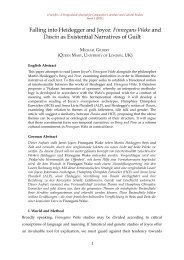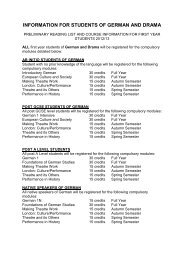Student Handbook - The School of Language, Linguistics and Film
Student Handbook - The School of Language, Linguistics and Film
Student Handbook - The School of Language, Linguistics and Film
You also want an ePaper? Increase the reach of your titles
YUMPU automatically turns print PDFs into web optimized ePapers that Google loves.
Taking notes<br />
Learning to take clear notes is a valuable skill. You should aim to take down key ideas,<br />
rather than attempt to write down everything that is said. Listen for clues as to when a key<br />
point is being made or when a lecturer is moving on to the next heading. Use a spidergraph<br />
system, or write your notes as headings or sub-headings <strong>and</strong> leave plenty <strong>of</strong> space to fill in<br />
other details later. It is better to keep listening rather than frantically write. If you absorb what<br />
you hear, your headings will act as memory joggers <strong>and</strong> you can write further notes in your<br />
own words later. Go through your notes as soon as possible after the class <strong>and</strong> try to fill in<br />
any details <strong>and</strong> clarify any abbreviated bits.<br />
Make sure that you label your notes, <strong>and</strong> any h<strong>and</strong>outs, with the date <strong>and</strong> name <strong>of</strong> module<br />
<strong>and</strong> teacher. This will enable you to make use <strong>of</strong> the information when you are preparing to<br />
write essays.<br />
<strong>The</strong> English <strong>Language</strong> <strong>and</strong> Study Skills section <strong>of</strong> the <strong>Language</strong> Centre (Room 1.24 on the<br />
first floor <strong>of</strong> the Bancr<strong>of</strong>t Building) <strong>of</strong>fers a number <strong>of</strong> free courses in study skills where you<br />
can learn strategies for taking good notes, <strong>and</strong> other ways to get the most out <strong>of</strong> your<br />
studies.<br />
Feedback<br />
Questions <strong>and</strong> discussion in class, the essays you write, etc, <strong>and</strong> your teachers’ comments<br />
on them all stimulate <strong>and</strong> help you clarify your ideas, <strong>and</strong> also show the effectiveness <strong>of</strong> the<br />
teaching/learning process. You are encouraged to discuss your essays individually with your<br />
teachers, who will usually set aside times to do this when any work is returned. You should<br />
discuss your general progress with your Adviser each semester.<br />
Coursework will be returned <strong>and</strong> feedback <strong>of</strong>fered within four term-time weeks <strong>of</strong> the<br />
submission date.<br />
Deadlines<br />
Deadlines for h<strong>and</strong>ing in coursework will be put in writing in a module h<strong>and</strong>out, on QMPlus,<br />
<strong>and</strong> sometimes also on the noticeboards. <strong>The</strong>y must be treated as absolute, <strong>and</strong> it is your<br />
responsibility to make sure you know what the deadline is for each piece <strong>of</strong> coursework, as<br />
you will be penalised if you miss it. Do note that a deadline is only the last date on which a<br />
piece <strong>of</strong> work can be submitted, not the first, <strong>and</strong> you would be well-advised not to leave<br />
work to the last minute. If you have extenuating circumstances, you may be able to ask for<br />
an extension to the deadline (see § 4 DEALING WITH PROBLEMS). Late work h<strong>and</strong>ed in<br />
up to two weeks after the deadline without an agreed extension will receive a maximum<br />
mark <strong>of</strong> a bare pass (40%). Work h<strong>and</strong>ed in more than two weeks late without an agreed<br />
extension will receive a mark <strong>of</strong> zero. Failure to submit coursework may also lead to deregistration<br />
from a module.<br />
Time management<br />
To be sure <strong>of</strong> meeting deadlines, it is vital that you plan ahead. <strong>The</strong> freedom <strong>of</strong> choice you<br />
have under the modular system makes it impossible for Module Organisers to prevent<br />
deadlines for different modules from coinciding. Stagger your essay writing <strong>and</strong> get some<br />
essays out <strong>of</strong> the way well before the common deadline so you have time to think properly<br />
about the later ones. Remember too that a lot <strong>of</strong> students will be looking for the same library<br />
books at the same time. Poor time management is NOT considered an extenuating<br />
circumstance, <strong>and</strong> it can seriously jeopardise your final mark.<br />
<strong>The</strong>re are some things that you can do to lessen the panic <strong>of</strong> running out <strong>of</strong> time for<br />
assignments.<br />
• Use a year planner to highlight the actual dates <strong>of</strong> your deadlines in each semester.<br />
21







